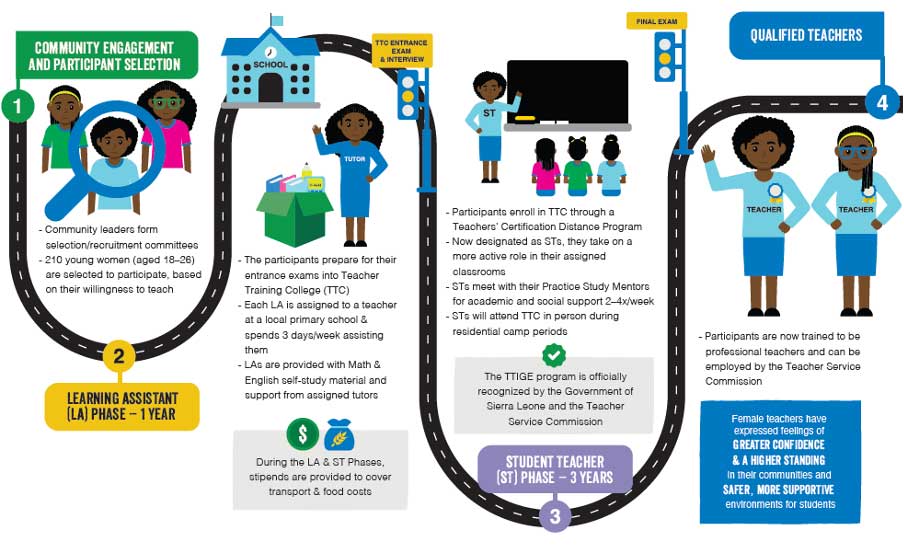You are here
- Home
- Research
- Projects
- Centre for the Study of Global Development
- Research
- Preparing a pathway to teaching for rural women in Sierra Leone
Preparing a pathway to teaching for rural women in Sierra Leone
Principal Investigators: Dr Deborah Cooper, Prof Freda Wolfenden
Co-investigators: Dr Alison Buckler, Prof Liz Chamberlain, Malcolm Griffiths, Lina Aghajanian, Dr Margaret Ebubedike, Kimberly Safford, Dr Martin Crisp
Consortium Partners: Plan International, Forum for African Women Educationalists (FAWE)
Funders: Foreign, Commonwealth and Development Office and Dubai Cares
Focus Country: Sierra Leone
Dates: 2013-present
Status: Ongoing
The Learning Assistant/Student Teacher (LA/ST) model is pathway to teaching for women. In Sierra Leone where female teachers are in short supply (Mackintosh et al., 2020) and there is a high female dropout, this programme offers a route for women to return to education and enter the teaching profession.
The model involves four stages as depicted in the diagram below:
- Community leaders are engaged to select young women to enrol on the programme
- Preparation for Teacher Training College entrance exam and interview, with self-study materials and support from tutors
- Pairing of LAs with teachers at local primary schools
- Enrolment in Teacher Training College
- Taking on a more active role in their assigned classroom
- Continuous academic and social support from Practice Study Mentors
- Preparation for Teacher Training College final exam
- Participants are now qualified teachers and can be employed by the Teacher Service Commission

Figure 1: The LA/ST model, image courtesy of Plan International Canada
PDF version of the LA/ST model infographic
The LA/ST programme has been in effect since 2013 in rural districts in Sierra Leone where there are few women teachers and overcrowded schools. The programme was designed and guided by the OU and operationalised in Sierra Leone initially by the Forum for African Women Educationalists (FAWE) and then by Plan International.
Between 2013 and 2021, the LA/ST programme was embedded within Girls Education Challenge (GEC) projects in Sierra Leone funded by the UK’s Foreign, Commonwealth and Development Office (FCDO), which the OU was part of in consortia led by Plan International. Over 3 cohorts, 750 women were supported to access teaching qualifications. The LA programme continues to be delivered in Sierra Leone as part of the Teacher Training for Inclusive Girls’ Education (TTIGE) project being delivered by Plan International and the OU, with funding from Dubai Cares.
Studies into the LA/ST model implemented in the GEC projects, by Crisp, Safford and Wolfenden (2017), Chamberlain and Safford (2019) and the National Foundation for Educational Research’s endline evaluation (Chu et al., 2021), suggested that the model had ‘transformational impact’.
More recently, the OU has led on a couple of evidence-generating studies evaluating the LA/ST component as part of one of the GEC projects, Girls’ Access to Education (GATE). Firstly, a follow up study of teachers and teaching quality in schools, where former LA/STs are teaching, through the lens of a participatory qualitative study. This research study found the female teachers were well regarded and demonstrated strong professional identities as trained and qualified teachers, with a professional role extending beyond the classroom. They took pride in their roles as gender champions (Aghajanian et al., 2023).
Secondly, a piece of participatory video research with former LA/STs. The film was made in collaboration with Sierra Leonean film company We Own TV and focused on critical moments when the LA/STs felt they had become a teacher. Participatory video engages research stakeholders in collective and proactive dialogue about a topic they have an interest in, by providing them with the support to make their own film about it. One teacher reflects on how she was a disappointment to her family and community after getting pregnant at a young age. She took up the challenge of becoming a teacher to change mindsets about what is possible for young mothers. Another teacher recalls being stopped by some pupils when out shopping. A local man asked, ‘are you a teacher?’. She describes the pride when she was able to say ‘yes, really, I have become a teacher’. The film is available here.
Access the LA/ST comprehensive set of resources is freely available. All the materials are Open Educational Resources (OER) and, with the exception of named third-party contributions, can be adapted for your own educational context.
References
Aghajanian, L., Cooper, D., Ebubedike, M. and Griffiths, M. (2023) Making a difference to teaching quality: A study of teaching quality, values and professional identity of newly qualified female teachers in Sierra Leone. The Open University.
Chamberlain, L. and Safford, K. (2019) ‘Learning Assistants in Sierra Leone: model, innovation, and impact’, 9th Pan-Commonwealth Forum on Open Learning - Innovations for Quality Education and Lifelong Learning (PCF9), Edinburgh, 9-13 September.
Chu, J., Kubacka, K. and Price, J. (2021) Endline Evaluation of the Girls’ Access to Education, Girls’ Education Challenge (GATE-GEC) Programme, National Foundation for Educational Research (NFER). Available at: https://girlseducationchallenge.org/media/bdjdqqlp/gate-gect-endline-evaluation.pdf.
Crisp, M., Safford, K. and Wolfenden, F. (2017) It takes a village to raise a teacher: the Learning Assistant programme in Sierra Leone. The Open University and Plan International. Available at: https://doi.org/10.13140/RG.2.2.19452.03200.
Mackintosh, A., Ramirez, A., Atherton, P., Collis, V., Mason-Sesay, M., Bart-Williams, C. (2020). Education Workforce Supply and Needs in Sierra Leone. The Education Commission. Available at: https://educationcommission.org/wp-content/uploads/2020/12/3-EW-Supply-and-Needs-Paper.pdf.
Contact Us
Whatever your reasons for wanting to connect with us, you can contact us via email or social media on the addresses below
Email: CSGD@open.ac.uk
Twitter: @OU_CSGD
Sign up to our mailing list to receive the latest news on our research, events and publications.
.jpg)